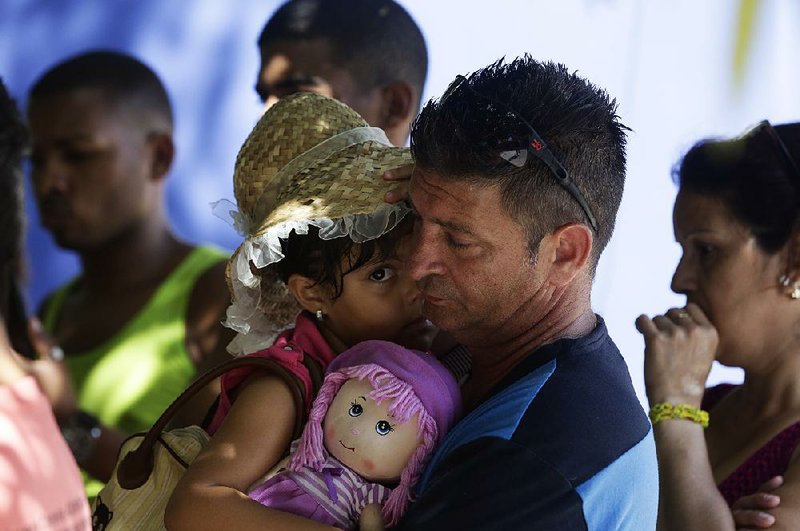HAVANA -- The Cuban government hailed President Barack Obama's decision that ends automatic legal residency for any Cuban who touches U.S. soil, while the Cuban people mourned the end of an easy pathway to a new life in the United States.
RELATED ARTICLE
http://www.arkansas…">2nd try set on credit for Cuba
Average Cubans and opponents of the island's communist government said they expected pressure for a policy overhaul to increase with the elimination of a mechanism that siphoned off the island's most dissatisfied citizens and turned them into sources of remittances supporting relatives who remained on the island.
The repeal of the "wet foot, dry foot" policy went into effect immediately after a Thursday afternoon announcement. It followed months of negotiations focused in part on getting Cuba to agree to take back people who had arrived in the U.S.
Cubans fearful of an imminent end to a special immigration status bestowed during the aftermath of the Cold War had been flocking to the United States since the Dec. 17, 2014, announcement that the U.S. and Cuba would re-establish diplomatic relations and move toward normalization. About 100,000 left for the United States after the declaration of detente, many flooding overland through South and Central America and Mexico in an exodus that irritated U.S. allies and other immigrant groups and spawned bitter complaints from the Cuban government.
"It was creating serious problems for the security of Cuba, for the security of the United States and for the security of our citizens left vulnerable to human trafficking, migratory fraud and violence as a result of the incentives created by these preferential policies," said Josefina Vidal, Cuba's top diplomat for U.S. affairs.
Obama is using an administrative rule change to end the policy. Donald Trump could undo that rule after becoming president next week. He has criticized Obama's moves to improve relations with Cuba. But ending a policy that has allowed hundreds of thousands of people to come to the United States without visas also aligns with Trump's commitment to tough immigration policies.
"This was bound to happen at some point," said Havana taxi driver Guillermo Britos, 35. "It could impose a more normal dynamic on emigration, so that not so many people die at sea, but it could also take an escape valve away from the government, which was getting hard currency from the emigrants."
President Bill Clinton created the "wet foot, dry foot" policy in 1995 as a revision of an immigration policy that allowed Cubans caught at sea to come to the United States and become legal residents in a year.
The two governments have been negotiating an end to "wet foot, dry foot" for months and finalized an agreement Thursday.
But Cubans who had left their homeland and were trying to reach U.S. soil when the decision was announced lamented the policy change.
"It has fallen on us like a bucket of water because were never thought that at this point and with so little time before Obama leaves office that his government would make this horrible decision," said Eugenia Diaz Hernandez, a 55-year-old Cuban in Panama whose voyage with her daughter and granddaughter had taken her through Guyana, Brazil, Peru, Ecuador and Colombia. "We are adrift."
Relations between the United States and Cuba were stuck in a Cold War freeze for decades, but Obama and Cuban President Raul Castro established full diplomatic ties and opened embassies in their capitals in 2015. Obama visited Havana in March. Officials from both nations met Thursday in Washington to coordinate efforts to fight human trafficking.
Anti-Castro Cubans in Miami were mixed in their responses, with some expressing anger at Obama for what they called another betrayal of ordinary Cubans. Others said they thought the measure would increase pressure for change in Cuba.
"People who can't leave, they could create internal problems for the regime," said Jorge Gutierrez, an 80-year-old veteran of the Bay of Pigs invasion. But he added, "From the humanitarian point of view, it's taking away the possibility of a better future from the people who are struggling in Cuba."
With the end of the "wet foot, dry foot" policy, hundreds of Cubans were stranded in transit in South and Central America.
Gabriel Marin and his wife were among 53 Cubans at the Caritas migrant shelter in Panama's capital when the decision was announced. Most had arrived in recent weeks after slogging a similar route that involved a flight from Cuba to Guyana followed by traversing the jungles of Brazil, Peru, Ecuador and Colombia and finally a grueling hike across the Darien Gap into Panama.
"This has left us frozen, in total limbo, and sad because it wasn't worth risking everything, our lives," Marin, a 24-year-old cook wearing a Venezuelan soccer jersey said Thursday shortly after the news broke. Police in Peru near the Brazilian border had stolen $200 from the couple and now they were stuck.
"We can just wait and see what Trump can do," Marin said. "I have a bunch of cousins waiting for me in the United States."
Information for this article was contributed by Matthew Lee, Kevin Freking, Gisela Salomon, Michael Weissenstein, Bill Barrow, Juan Zamorano, Christopher Sherman and Alba Tobella of The Associated Press.
A Section on 01/14/2017

